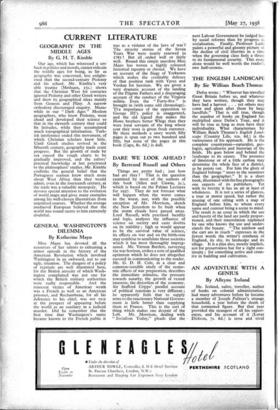DARE WE LOOK AHEAD? By Bertrand Russell and Others
Things are pretty bad ; just how bad are they ? That is the question• examined by most of the authors of this book (Allen and Unwin 5s.), which is based on the Fabian Lectures for 1937. They do not forecast what will happen when the worst comes to the worst, nor, with the possible exception of Mr. Morrison sketch the New Jerusalem to be built when - the storm clouds have passed away. Lord Russell, with practised lucidity and logic, analyses the influence of science on society and casts doubts on its stability ; high as would appear to be the survival value of science,' its effects on war and on the birth-rate may combine to annihilate those societies which it has Most thoroughly impreg- nated. Mr. Vernon Bartlett, surveying. the war horizon, strikes a note of qualified optimism which he does not altogether succeed in communicating to the reader. Mr. G. D. H. Cole, in a clear and common-sensible study of the econo- mic effects of war preparation, describes ' the immediate stimulus, the pressure towards autarky, the growth of vested interests, the distortion of the economy, Sir Stafford Cripps' parallel account of political reactions is very different ; he apparently feels that to supply arms to.the reactionary National Govern- , xnent is little better than supplying them to Franco. This is the sort of thing which makes one despair of the
Left. Mr. Morrison, dealing with • "Socialism Today," pleads that the
next Labour Government be judged less by social reforms than by progress in socialisation. Finally, Professor Laski paints a powerful and gloomy picture of the decline of civil liberties in a time when the governing class feels a threat to its fundamental security. This essay alone would be well worth the leader's two half-crowns.


















































 Previous page
Previous page